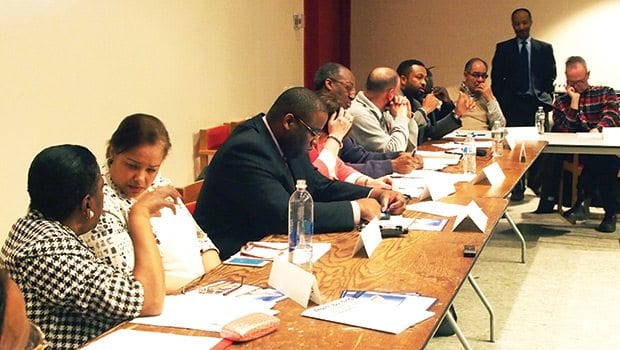
The Roxbury Strategic Master Plan Oversight Committee voted Monday to adopt a plan that would require developers building on publicly-owned land in Roxbury to commit to so-called living-wage standards for construction workers and for permanent jobs created by new construction projects.
The body rejected by a narrow vote a proposal to require new businesses on publicly-owned parcels to commit to card-check neutrality — a provision requiring employers to commit to not blocking employees’ right to unionize.
The committee’s refusal to back the card-check provision appeared to be aimed at protecting the Parcel 9 development team, which seeks to develop a hotel and retail space at the corner of Melnea Cass Boulevard and Washington Street. At past meetings, members of the development team said the provision would kill their deal.
The committee’s rejection of the card check provision sparked an uproar among the audience, which was packed with labor activists from across the city, and opposition from elected officials, who are non-voting members of the body.
At times the meeting descended into shouting matches, with one audience member threatening to fight committee chairman Norman Stembridge. Union activists and community members in support of the “good jobs provision” frequently shouted down committee and audience members who questioned the ordinance.
Many good jobs provision supporters said they feared a lack of well-paying jobs would accelerate displacement of Roxbury low-income residents.
“What’s happening here is ethnic cleansing of people of color,” said Stephona Stokes, a Roxbury native who lives in Roslindale. “What’s happening here is no different from what’s happening in Chinatown and East Boston.”
Roxbury resident Rodney Singleton, however, said paying higher wages to construction workers would not necessarily help low-income people remain in Roxbury, noting that buyers need an income of at least $100,000 to buy a home in Roxbury.
“We’re fighting over the wrong thing,” he said. “A housing unit in Roxbury costs $400,000 to build. That’s a fact. Anyone making $14 to $18 can’t buy housing in Roxbury.”
Roxbury developer Fred Fairfield, a longtime union member, said unions should be required to “open their doors to Roxbury residents” before the committee adopts language on card-check neutrality.
The living wage guidelines the committee adopted, drafted by a coalition called the Roxbury/Dorchester Campaign for Good Jobs, require developers to commit to a construction workforce that is 51 percent people of color, 51 percent Boston residents and 15 percent women. The ordinance also calls for what organizers say is a living wage for all permanent jobs created on publicly-owned parcels of land. Those wages would start at $13.89 an hour in 2015 and rise to $16.89 an hour by 2017.
The guidelines would apply to the eight parcels of publicly-owned land overseen by the Roxbury Strategic Master Plan Oversight Committee. The Oversight Committee was established after the completion of the Roxbury Master Plan, a years-long process through which neighborhood residents, elected and city officials and representatives of major institutions in and around Roxbury agreed on development guidelines for vacant parcels of publicly-owned land. The master plan that community members ultimately signed off on calls for the development projects that spur job growth, housing and economic growth in Roxbury.
Under the living wage standards adopted by the Oversight Committee, businesses would be required to maintain a permanent jobs workforce that is 51 percent people of color, 51 percent Boston residents and 51 percent women. Businesses would be required to maintain at least 75 percent of all jobs at full-time levels with benefits.
Committee members expressed support for the measures, and voted to forward them to the Walsh administration with a request that they be implemented city-wide.







